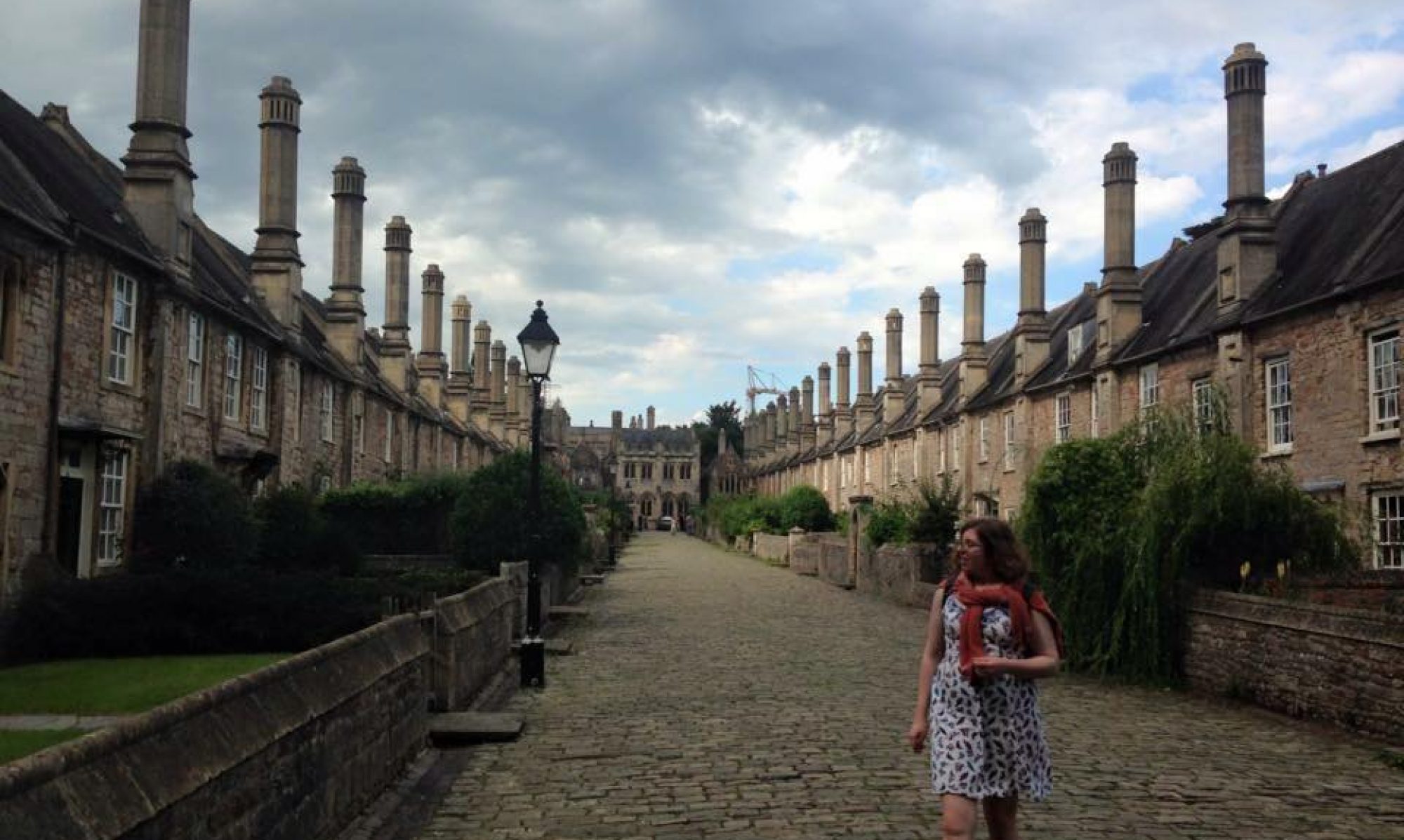The specially-recorded video of Charlie Pemberton and Sarah MacDonald’s beautiful performances of Sarah’s The Garden in Spring and Janet Wheeler’s Said a Blade of Grass has now been released on YouTube.
The Enkindled Spring workshopped by Sarah Leonard and Stephen Gutman with Judith Weir
Sarah’s song The Enkindled Spring, setting a poem by D.H. Lawrence, was workshopped by Sarah Leonard, Stephen Gutman and Judith Weir as part of Benslow Music’s Young Composer Competition 2021.
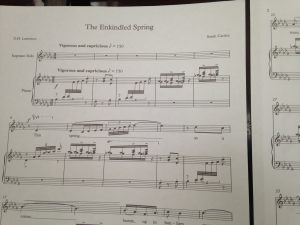
Ivy, Chief of Trees It Is published in Multitude of Voyces Anthology Volume 3
Multitude of Voyces published their third volume of sacred music by women composers in November 2020. Sarah is thrilled that her carol Ivy, Chief of Trees It Is features in the anthology alongside so many wonderful pieces by women composers historical and contemporary.
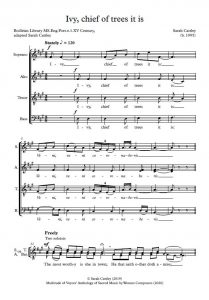
The Garden in Spring – a commission for Newnham College
Sarah, along with fellow Newnhamite and MazeMusic composer Janet Wheeler, was delighted to be asked to write a song for a recording session for Newnham College’s Alumni Development Office. Soprano Charlie Pemberton, a choral scholar at Newnham, and pianist Sarah MacDonald, Director of Music at Selwyn College, constructed a programme with a garden theme. The recording took place in Newnham’s Old Labs on 1st September.
Janet Wheeler’s song sets Khalil Gibran’s Said a Blade of Grass. Sarah’s song, The Garden in Spring, sets part of a poem by Fredegond Shove, a poet who attended Newnham during the 1910s. Fredegond Shove had two collections of poetry published during her lifetime; she was a relation of Ralph Vaughan Williams, who set four of her poems as songs. Unfortunately she is now very little known.
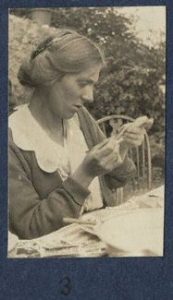
Hale Sterne Superne – a commission for a virtual evensong
This virtual evensong was put together by present company (Beatrix Swanson Scott and Morgan Edward Overton) with singers from the chapel choirs of Trinity and Gonville and Caius Colleges. All the music was specially written by female Cambridge composers Siri Livingston (Preces and Responses), Emily Hazrati (Psalm), Katrina Toner (Magnificat), Marcella Keating (Nunc dimittis) and Sarah (Anthem – Hale Sterne Superne).
Hale Sterne Superne is a setting of three verses from a Scots poem in praise of Mary by William Dunbar. The poem has a fantastic lilting rhythm that just leaps off the page when you read it, which made it a real pleasure to set to music.
Dream Fever broadcast on Resonance FM – 30th July
Composer Benjamin Tassie hosts Future Renaissance, a radio show on Resonance FM dedicated to contemporary music for early instruments. The final episode of this series aired on 30th July, and began with Sarah’s piece Dream Fever for viol and electronics, played by Liam Byrne, alongside music by Jo Thomas, Sarah Angliss and Marianne Schuppe. Every episode features an eclectic mix of the beautiful and the wacky, as well as insights from a different interviewed guest. The whole series is available to listen to again on Benjamin’s website, here.
‘Meeting in the Fields’ runner-up in Benslow Music Young Composers Competition
This year’s Benslow Music Young Composers Competition gave entrants an opportunity to write for the London Klezmer Quartet. The workshop would have taken place in May but was unfortunately cancelled due to coronavirus. The judging went ahead despite this, and William Dryland’s piece ‘Whistler Medley’ was chosen as the winner. His piece will be performed by the London Klezmer Quartet at Benslow in the autumn. Congratulations William!
Sarah’s piece ‘Meeting in the Fields’ was named runner-up. Sarah was delighted to hear that competition judge Judith Weir described it as: “Forthright and exciting, bold and vividly shaped melodies. The metrical writing is lively and interesting.”
A Viking Farewell premiered by Fenella Humphreys
Violinist Fenella Humphreys has been streaming concerts live from her living room during lockdown, showcasing a wide variety of music old and new. Her 8th Homemade Concert, broadcast on 6th May, included a beautiful premiere of Sarah’s piece A Viking Farewell alongside Adrian Sutton’s Arpeggiare Variations.
Fenella’s YouTube channel is linked here – do have a listen to more of her wonderful concerts.
Winner of the Jesus College Composition Competition
Sarah is delighted to have won the inaugural Jesus College Composition Competition. The competition, launched in November 2019 with the support of the choir’s alumnus Max Hadfield, invited composers to set a prayer by John Henry Newman:
O Lord, support us all the day long of this troublous life, until the shades lengthen and the evening comes, the busy world is hushed, the fever of life is over and our work is done; then Lord, in thy mercy, grant us safe lodging, a holy rest, and peace at the last. Amen.
Judges Richard Pinel and Grayston Ives chose Sarah’s piece and runner-up Isaac Adni’s to be performed by the choirs of Jesus College in Michaelmas term 2020.
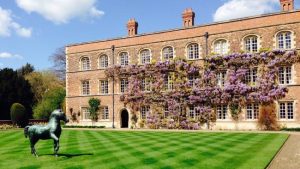
A lovely review of the Fitzwilliam Service
From Jason Overall’s review of the first releases in Selah Press’ Sarah MacDonald Choral Series:
‘This setting of the evening canticles quickly establishes an imaginative, adventurous compositional voice. Cattley’s harmonic language is comfortable in ambiguity, and many phrases attain a weightless feel that has little tonal gravity. Despite this lack of strong pitch center, the music is never harsh or dissonant. Vocal lines are mainly diatonic and even conventional, even as the accompaniment undermines some expected harmonic implications. Of even more interest, however, is the complex rhythmic organization. Cattley contrasts 6/8 organization against 3/4, employing creative use of hemiola, and she explores unconventional beat subdivisions. These rhythmic hijinks will challenge singers, yet they infuse the music with a spirited vitality that is nothing short of bewitching. The Magnificat is written for two-voice choir with only a handful of divided notes in the lower voice, while the Nunc dimittis is cast more consistently in three voices. Where the first canticle dances, the second one sings lyrically. Expansive lines that outline wide intervals gain intensity from a similar rhythmic intricacy, yet restrained within a gentle pacing. Whereas the first Gloria Patri exults, ending fortissimo, the concluding Gloria Patri maintains the expressive flow of the preceding canticle. The organ part throughout is interesting, affording players ample opportunities for interesting solo colors, and of only moderate technical difficulty. This extremely effective service will be useful for adults and children, and while it may require some careful rehearsal, choirs are sure to welcome it into their evensong repertoire.’
Jason Overall
The Journal of the Association of Anglican Musicians
Volume 29, Number 3 – March 2020
